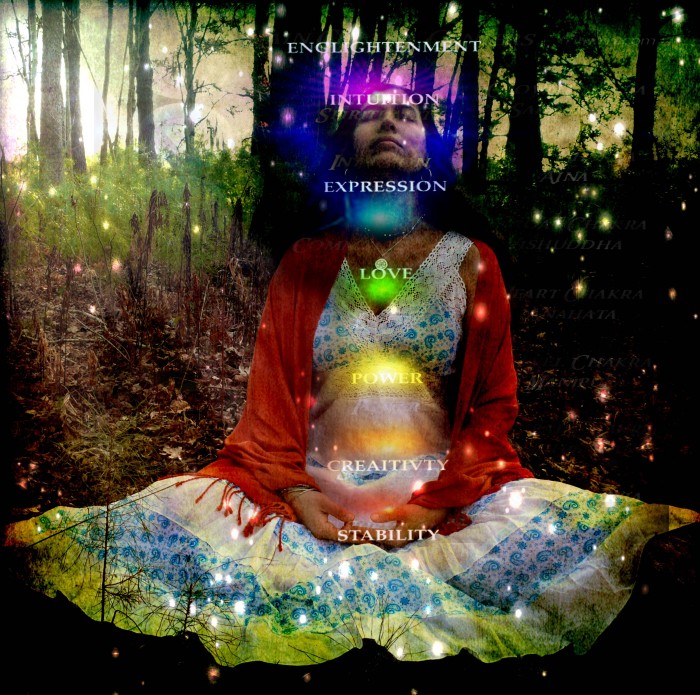“Learn to get in touch with the silence within yourself and know that everything in this life has a purpose.” ~ Elisabeth Kubler Ross
Ever since I was a child, I’ve instinctively sought out natural settings: earth I could walk barefoot on, leaves I could hear rustling in the breeze, little corners in the woods I could built stick forts in. They were my favorite!
I could hear these places calling out to me, throughout my urban upbringing, inviting me to interact with them: to feel my own breath in the wind, my heartbeat quicken with thunder, my eyes widen before each wondrous sight nature placed before me, and my ears perk at every little sound.
It was my grandfather who taught me how to really listen. Starting when I was just three he’d take me on nature walks on which we’d suspend our gait and stand in silence just to tune into the world around us. “Did you hear that?” he would excitedly ask.
“Silence is not silent. Silence speaks. It speaks most eloquently. Silence is not still. Silence leads. It leads most perfectly.” ~ Sri Chinmoy
I soon learned that within every twig snapping, every pond splashing, every bush rustling and in every leaf crackling there were secret messages encoded: a bunny rabbit had hopped by, or a duck had landed on the pond, or the family dog, Toby, was following us not too far behind.
I thought that if I was quiet enough I would even be able to hear the stars sparkling in the night’s sky, and the fireflies turning on and off.
Silence works as a backdrop for hearing and experiencing the purest forms of nature’s sounds. Sounds that we all find soothing, like water trickling through a gentle brook, bumblebees buzzing between flowers, birds calling out to their mates, the sound of our own breath.
Since antiquity, yoga practitioners have engaged these natural soundtracks as passages to the soul. Science has recently confirmed that their sonic frequencies naturally resonate with those of our chakras—vibrations at a sub-atomic level—nourishing us in ways nothing else can.
Today’s modern culture is greatly deprived of life’s natural soundtrack.
Many of us seem more frequently exposed to the sounds of man-made machines than the sounds of nature. From our refrigerators, juicers and other electronic household appliances, to vehicles of transportation, buzzing fluorescent lights, construction equipment and leaf blowers—to name a few—we are bombarded with noise.
Even when we try to escape the noises, sometimes we can’t. These sounds seem to be everywhere! Our species has created so much noise on our planet that it is continually disorienting migrating birds and animals, on both land and sea. Just imagine what it is doing to us.
While marine mammals will try to beach themselves to escape sonic pollution, we human beings are slow at making efforts to minimize the noise in our own lives. Instead, we have come to embrace dangerous levels of noise as acceptable in our modern society, becoming desensitized to the environmental cacophony around us. And yet, the delicate interdependence we share with all other life on our planet is paramount to our wellbeing.
When we interrupt, or sever our communications with nature, not only do the external environments sustain wounds, so do we.
Chronic suffering from noise pollution does not happen overnight. It is the cumulative result of a lifestyle in which we repeatedly expose ourselves to loud or constant sounds on a regular basis. From cardiovascular disease to nervous conditions, continuous noise in our working or living environments has a damaging effect on our bodies, regardless of how desensitized we have become to it, or how accustomed we have grown to it.
Even when we think we are not hurting ourselves, we may be. This is what happened to me. I share my story with you today in hopes that it prevents just one person from suffering ear damage.
Two years ago, after accidentally exposing myself to loud music, I was kept awake all night by a painful, high pitched screeching in my ears.
The oppressive sound came with massive headaches and refused to leave. That winter, in tears and disbelief that—according to medical professionals—the rest of my life would be full of torturous noise, I grieved the loss of silence.
The noise in my ears is on 24 twenty-four hours a day, seven days a week, without interruption. Some days it is soft. Other days, the volume is raised so suddenly that I am startled by it. It disrupts my sleep, it exhausts me, and wreaks havoc on my concentration, which makes writing extra challenging for me, among other things.
This brutal and unforgiving auditory abnormality is called tinnitus, and according to the American Tinnitus Association, around 50 million Americans, or 15 percent of the population, will experience some form of tinnitus in their lifetime. And yet, before I was diagnosed with tinnitus nearly two years ago, I never even knew it existed.
I remember the first big concert I attended. I was fourteen. When I got home that night and tried to sleep, the loud ringing in my ears did more than startle me: it scared me. I had never experienced anything like it before, and I knew it wasn’t a good sign. Still, it didn’t stop me from attending more concerts without earplugs. By morning the sound had disappeared, so I didn’t consider it a health risk.
When our ears continue to ring after exposure to loud sounds, it is a sign that they have been wounded.
Our ears are extremely complex, sensitive organs. The sounds they receive send vibrations from our eardrum to the inner ear, or cochlea. The cochlea is lined with delicate hair cells called stereocilia, which then send signals along the auditory nerve to our brain. Our brain then registers sound in our conscious awareness.
Toward the end of my adolescence, I moved into an ashram where I learned that in Bhakti Yoga there are nine processes to self-realization. The first is hearing, or sravanam. For ancient Sanskrit texts declare that the whole universe is vibrating with sound. Sound has the power to trap us, or liberate us. Therefore, they taught me, the sounds we expose ourselves to greatly influence our consciousness.
We benefit when we seek out sounds that uplift us: the enlightening words of sages and the ancient mantras that will awaken our souls, nature’s soundtrack, beautiful music.
Then came the big kirtans, where the sounds of drums and cymbals, known as kartals, were played so loudly in excitement that they forced us to raise our voices just to be able to hear the mantras we were chanting.
Every morning and evening we had kirtan, for years on end. After decades of this a Swami friend of mine also suffers from tinnitus. In fact, I know of several regular kirtan participants that suffer from acoustic injuries of some form or another. Today some of them avoid the sound of kartals entirely.
M. Charles Liberman, a professor of otology at Harvard Medical School, points out that once the ear becomes injured, it is more sensitive to sounds. He also states that it is impossible to trace out a singular cause for ear damage, as the cochlear nerve degenerates over time.
This means that one can attend kirtans for years and feel fine, and then there will be that one loud kirtan (or concert) that is the last straw, breaking the camel’s back, or permanently damaging the auditory nerve fibers, as the case may be.
Many musicians eventually develop tinnitus. I find it ironic that in the name of hearing scared mantras, and making music, we may actually be hurting our ears’ ability to hear.
Having chronic tinnitus means that you hear everything through a filter of phantom noise caused by neurotransmitters that are “stuck,” so the brain registers the lingering vibration of an extra loud sound, even years after the sound struck the tympanic membrane. This is similar to the way amputees continue to perceive pain in a limb long after it has been cut off. Those who suffer from chronic tinnitus eventually learn to bid farewell to silence.
Henry David Thoreau wrote about silence as the “universal refuge”: that place where all human beings could find solace and rest.
Humans are wired to seek out silence, he said. An inability to do so can drive some mad. Illegal interrogation techniques engage this knowledge to extract confessions from their prisoners by cruelly subjecting them to torturous sound machines. The subjects will say anything to make the sounds stop.
Consequently, statistics show that tinnitus has claimed more lives via the suicides of its sufferers than any other illness, as the anguish it creates can be extreme for some. And although there are many theories, some doctors insist that it was tinnitus that fed Van Gogh’s madness and drove him to cut off his own ear.
Since being diagnosed with tinnitus, I have had to readjust my attitude in everything I do; even in places I formerly considered my sanctuaries, like my asana practice. Suddenly savasana is noisy! The sound is like fingers on a chalkboard: It tightens my muscles instead of relaxing them.
After practicing yoga for so many years, I automatically breathe into whatever I am resisting. I attempt to embrace it, instead of pushing it away. This how I’ve been coping with my tinnitus: by believing that there is still silence within me. I just need to go deep enough to find it.
There is no need to go to India or anywhere else to find peace. You will find that deep place of silence in your room, your garden, or even in your bathtub.” ~ Elisabeth Kubler-Ross
In learning to cope with my tinnitus, I find myself tracing my relationship with silence and my relationship with sound over the course of my entire life. Like with the rhythm of a beating heart, it’s the silent intervals between sounds that fill the sounds with potency. The two work synergistically, much as light does to create shadow. As I tune into the noise in my ears it occurs to me that perhaps running away from it is much like running away from shadows.
Accordingly to ancient yoga texts, everything in the universe is threaded together by sound vibrations at the subatomic level.
The Chandogya Upanishad states that aum is the original, primeval sound from which all others emerged. As such it is found everywhere, perhaps even in what at first just sounds like noise.
This reminds me of an experience I had at a noisy yoga class many years ago, before I was diagnosed with tinnitus. The location couldn’t have been more visually stunning: our wooden yoga platform was set over turquoise colored seas on a tropical island, shaded by palm trees. Paradise!
But, it was carnival season at the nearby cruise port, and the noise around the island was so loud that there were times our yoga teacher had to shout just to be heard. Soon it became impossible to continue the class. He then asked us to assume savasana for the remainder of the class, and instructed us to “find the aum in the noise.” I found it ironic that people from all over the world were flying into this yoga retreat for peace and quiet, only to be challenged to find the peace and quiet within noise.
I’ll admit that it was very hard for me to hear aum in all those sounds, especially in the speedboats, which made me squirm. And I missed the sound of my breath, which got drowned out by the cacophony around us.
I longed for silence. I thought I needed silence to fully relax.
Yet, somehow, I was able to take my meditation into a deeper level: one that went beyond the racket of the speedboats, and the jet skies, and the party cruises blasting their calypso music over speakers. I lay in savasana searching for the silence that was inside of noise. Or was it the silence within myself, in spite of the external noise? Or was there really a difference between the two?
Quantum physics tells us that, at a sub-atomic level, we are all made of sonic frequencies.
That all matter is held together, and torn apart, by variations in vibration. In the yoga tradition, ancient Sanskrit texts present sound as holding the potential to either further entangle us in matter, or liberate us from it. They tell us we all have the ability to connect with healing sounds within us, even in the midst of a world filled with noise.
Today, the noise that challenges my peace is not externally generated. Instead, as one who has been diagnosed with tinnitus, the continuous noise persists even when I cover my ears with my hands. In fact, when tinnitus sufferers do this, the noise we hear just gets louder.
In the ancient science of Ayurveda they say chronic tinnitus is due to an imbalance in the air element in one’s body: air, or ether, being the element that carries sound.
A continuous sound playing in one’s ears usually affects those who are extra sensitive, or tuned in to more sonic frequencies than the average person. While genes have been shown to contribute to hypersensitive hearing, so has poor eyesight. In an effort to compensate for the handicap of one of our senses, our bodies will enhance others. I found this to be true in my own experience: as my eye-sight worsened, my hearing became very acute.
Tinnitus sufferers are therefore quite sensitive to electromagnetic transmissions.
…Like those caused by cell phones, cordless phones, WiFis, microwaves, computers or cell phone towers. These all fall within vata sensitivities in Ayurveda: or being affected by invisible vibrations found in the ether.
This powerful electromagnetic frequency radiation is as disorienting to our own bodies, as it is to the birds, butterflies and bees: they have, most tragically, all become disoriented from the migratory routes they have instinctively been following for ages because of all the “electro-smog” we humans are generating.
Tinnitus is therefore more than just a constant ringing, or buzzing, or swishing in the ears. Tinnitus affects its sufferers on deep levels. It is often accompanied by chronic insomnia, migraines, depression, “brain fog,” fatigue, and even heart arrhythmias. It can potentially affect our performance, making us appear spaced out and incompetent at times: disorienting us, like bees flying off course.
When I feel myself drifting off course, beckoned by the siren calls of tinnitus, I concentrate on perceiving the silence that always lives deep inside of me: behind this painful noise in my ears. In yoga they call this deep absorption in meditation dhyana. Love mystics like Rumi describe it as a concentration so intense, so fierce, and so full of such absorbing passion that one becomes deafened to all other sounds, but the sound of love.
According to ancient yoga texts, love is relational.
So we find it in the relationships between opposite energies in the universe: between silence and sound, pauses and beats, notes resounding and the spaces between the notes. In this paradigm, silence and sound interact synergistically. Since we are all wired to appreciate silence, perhaps tinnitus sufferers can learn to appreciate the constant sound in their ears, as the other side of silence: The silence that exists within the music. The silence between heart beats.
“Silence is the root of everything. If you spiral into its void, a hundred voices will thunder messages you long to hear.” ~ Rumi
As someone living with tinnitus every day, I try to listen for a deeper silence now, as I surrender to the idea that my life is now one of constant noise. Resisting or resenting the noise in my ears makes it worse. And although I do not understand why tinnitus appeared in my life, I am living with it all the time, so I need to have faith that this tinnitus is here for a good reason.
I need to believe that this pain is ultimately here -in my life- in the service of my own growth. Perhaps as soon as I learn the lesson it is here to teach me, it will go away. Or maybe it will be here for years, maybe even a lifetime. For now, I just try to get through each day, knowing that peace is always within me, deep beyond the sound in my ears.
If you are looking for ways to manage tinnitus in your life, here are ten basic things that I’ve found helpful. Keep in mind, however, that each case of tinnitus is as unique as each person is, so listen to whatever works for your own body. But these practices significantly decreased the volume of my own tinnitus. I hope they help yours as well:
- Practice daily relaxation techniques as often as you need to (deep breathing, yoga asanas, yoga nidra, meditation, etc.)
- Spend time in nature on a daily basis, away from human-made sounds.
- If you know you’ll be exposed to loud sounds, (like in a kirtan, movie theatre, social event, concert, urban area, etc) wear earplugs, as exposure to loud sounds will make your tinnitus louder.
- Stop resisting or resenting your tinnitus. That just makes it louder.
- Avoid using headphones or ear-buds, and all electronic sounds as much as possible. Even the faint buzz of your laptop can increase your tinnitus. Unplug daily for as long as possible.
- Avoid holding cell phones or cordless phones directly up to your ear (use the speaker phone feature as much as possible)
- The best “white noise” to drown out your tinnitus with are natural sounds (as opposed to electrically generated ones): crickets, frogs, cicadas, waterfalls, rain, etc. Expose yourself to these as much as possible, as they are very healing on many levels. It’s ideal if you can reproduce them at home, like by installing a little waterfall, for example.
- Observe a vata-soothing lifestyle and diet, including daily self-massage. (Consult an Ayurvedic doctor or literature for more details on this.)
- Avoid exposing your ears to chilly winds or cold weather.
- Submerge your ears in a natural body of water has healing effects, such as floating on a lake, river, calm sea or springs for five to 10 minute intervals at a time.
Love elephant and want to go steady?
Sign up for our (curated) daily and weekly newsletters!
Editor: Catherine Monkman
Photos: Author’s Own, Barry Silver/Flickr, Hobvias/Flickr
 Share on bsky
Share on bsky






Read 8 comments and reply